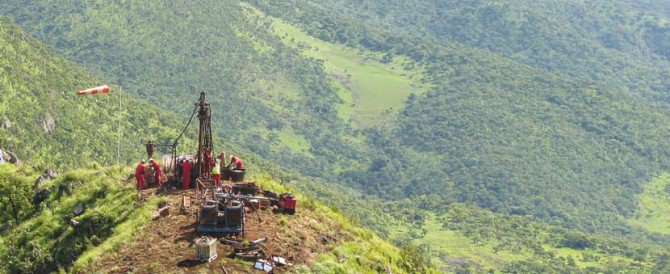When we stick our necks out as campaigners, we can expect to be criticised. On the wall in our office is a postcard with that wonderful quote—”all truth passes through three stages: first it’s ridiculed, then violently opposed, then accepted as self-evident.”
The truth we are talking about here is that natural resource deals should be done in the open so citizens know who is benefiting from their country’s wealth.
We’ve had plenty of ridicule in the past. When we first suggested, in Angola in 1999, that oil companies should disclose their payments to governments, we were laughed at. Not any more. New laws in Washington and Brussels will compel firms to say exactly what they pay on a project-by-project basis. Some of the oil companies are trying to fight it, but it’s too late: extractive industry transparency is now the norm.
And when we said the diamond trade shouldn’t be permitted to fuel vicious conflict in Angola, Sierra Leone and Liberia, the industry called us mad and naive. Within a few years we’d helped set up the Kimberley Process, bringing governments to the table to control the conflict diamond trade. There’s still a long way to go and the Kimberley Process has its problems—but these days nobody would suggest that diamonds mined by violent rebel groups should make it to market.

But there’s another form of response not included in that quote. It’s that they will also try to undermine you and attempt to distract attention from what you’re saying.
For nearly two years we have been publishing detailed investigations into a mining deal in Guinea, the acquisition by Beny Steinmetz Group Resources (BSGR) of the Simandou iron ore concession –called “the deal of the century” by some. Our investigations have revealed compelling evidence that BSGR officials signed corrupt contracts with the wife of Guinea’s ex-president, offering her millions of dollars for help in obtaining mining rights worth billions. See Global Witness’ previous statements on these issues here and here for the full context.
BSGR is under investigation in several countries including Switzerland, France and the United States, which is examining possible breaches of the Foreign Corrupt Practices Act. One of the company’s former advisers, Frederic Cilins, has pleaded guilty in the US on charges of obstructing the inquiry. Meanwhile, the new Guinean government has reviewed mining contracts awarded under the previous regime and taken Simandou away from BSGR.
BSGR has argued that the contracts are fake and the corruption allegations “entirely baseless”. Yet instead of tackling them, it seems more interested in throwing mud at Global Witness.
First was from Beny Steinmetz and three BSGR colleagues demanding that we hand over any documents mentioning them or the company, including information on sources. Their lawyers, Mishcon de Reya, argue that we are holding their “personal data”, as defined by the UK’s Data Protection Act.
Not only could handing over this information endanger our sources—it also twists the Act’s aims grossly out of shape. The Act was passed to protect individuals from the intrusions of a prying state or corporations, not muzzle reporting on matters of public interest and obvious international importance. In fact, the Act makes a clear exception for public-interest reporting. If BSGR’s attempt to misuse the Act were to succeed, it could jeopardize the work of investigative journalism across the UK.
It gets better. At the beginning of the summer it was reported that Beny Steinmetz was due to file a lawsuit alleging a conspiracy between mining giant Rio Tinto, George Soros and Global Witness to force him out of Simandou.
We’ve heard this one before. When our undercover film exposed the family and associates of the corrupt Chief Minister Abdul Rahman Taib of Sarawak in Malaysia, offering to set up deals for vast chunks of the state’s land and forests, ‘sources revealed that Global Witness are funded by Soros’. The “source” in question turned out to be our own website. It clearly states that we’re funded in part by the Open Society Foundations, which was founded by Soros—as are hundreds of other human rights organisations including Human Rights Watch. It’s not like we’re hiding it.
So if Mr Steinmetz and his team did file it would be fascinating to see what evidence of a conspiracy they brought. Of course we’re dependent on our funders – but firstly, our Open Society Foundations grant is not used for our Guinea work, and secondly, none of our funding relationships have ever stopped us being scrupulously independent.
We first came across BSGR while investigating another monster deal in Guinea involving business and political elites in China and Angola. As more on BSGR emerged, we decided to take a proper look. Within a week of us starting to ask around about Simandou, BSGR sent us a threatening letter accusing us of plotting against them and demanding to see a copy before publication of a report we had barely begun. This had never happened in 20 years of reporting and our interest was piqued: what did they have to hide?
Plenty, it might appear. It’s evidence, not influence, that drives our campaigning and there’s masses of it in the BSGR case. Uncovering deals like this is our bread and butter—it’s explicitly what we set out to do in our efforts to bring business into the open and help citizens benefit from their country’s natural resources.
We hope the courts, the media and the wider public will see these efforts for what they are—an attempt to distract attention from serious allegations of corruption. It’s frustrating that we have to spend time knocking back obviously hollow accusations that could be used to investigate real plots and secret deals, but we’re not going to stop doing what we do.
We haven’t been intimidated or taken instructions from anybody so far, and we’re not about to start.
Patrick Alley is a Founding Director of Global Witness.